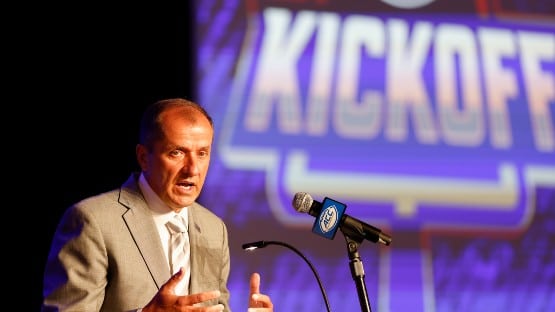
Jim Phillips wants you to believe, like Kevin Bacon at the end of “Animal House,” that it might look like unholy hell is raining down all around the ACC, but no, actually, all is well.
Spoiler: it’s not.
“This league is third right now in revenue as we go forward into wherever the next TV deals are for other conferences where we’ve looked at it,” Phillips acknowledged, saying what he would almost certainly prefer to be the quiet part out loud, at the open of the 2023 ACC Football Kickoff in Charlotte on Tuesday.
“Third is certainly a good position,” Phillips said, selling hard there, having to know that no one is buying, “but we want to gain traction financially in order to close the gap with, obviously, the SEC and the Big Ten, who have leapfrogged everyone.
“I think one of the presidents said it best,” Phillips said, and you could tell that they decided this one tested well in the focus group, which is why he concluded on this point: “are we chasing a dollar amount, or are we chasing success?”
I’ll give him a solid B for effort, but Tuesday’s State of the ACC Address from Phillips wasn’t the slam dunk that he and the league’s leaders needed it to be.
The backdrop is that we learned a couple of months ago about a group that came to be known in the media as The Magnificent Seven – UVA, Virginia Tech, North Carolina, NC State, Florida State, Miami and Clemson – that had reportedly discussed with each other the options for bolting from the ACC.
Phillips did his best to portray unity backstage, conceding that the episode “was painful to go through,” but that in the end, the “honesty and candor” that emerged “helped us.”
“I think that’s healthy. I think that’s healthy in any organization,” Phillips said. “You can maybe have it at the coach level or at the AD level, but when it’s at the CEO level with our presidents and chancellors, I think that has helped us come together and understand these are some of the things that we have to address.”
Problem is, the options for Phillips and the presidents to address the things that they need to address are limited, which is a nice way of saying nonexistent.
The ACC, under the watch of Phillips’ predecessor, John Swofford, locked itself in 2016 into a one-sided deal with ESPN that makes it impossible for Phillips and the school presidents to do anything other than rearrange the deck chairs on the Titanic in terms of the burgeoning TV money gap for the conference relative to the SEC and Big Ten.
The Titanic reference would be one way of describing the supposedly landmark agreement reached by the schools in May, at the height of the Magnificent Seven insurrection, that Phillips repeatedly referred to Tuesday as the “success incentive initiative,” corporate-speak for the schools agreeing to divvy up the same-sized TV money pie differently, based on success on the playing field, and pretending like that’s a solution.
It’s robbing Peter – Duke, Wake Forest, Boston College – to pay Paul – Florida State, Clemsons – but that’s really the only play the conference has, given the bad hand it dealt itself back in 2016.
“All of our schools are incentivized to make sure that we have as healthy of a financial portfolio as we possibly can,” Phillips said, doing his best to put lipstick on the pig.
“After the spring, if we wouldn’t have had any discussions or we wouldn’t have come out with a success incentive initiative program,” Phillips said – drink up – “I may have felt differently, but the regularity of which the board is meeting now and the regularity of our ADs meeting, et cetera, and how good ESPN has been, they understand the volatility that there is, but they also are looking to grow financially based on some of their recent events.
“So, you have a lot of mutually beneficial outcomes in this thing, so staying together, working collaboratively, working strategically, and we have some other things that we’re working on I can’t address with this group right now that are pretty exciting to try to address that revenue gap.”
That’s a nice thing to try to say – that there are things the conference is working on to try to address the revenue gap that they just can’t talk about.
But the reality is, Phillips isn’t palming an ace; the ACC has no other play.
There’s no new TV money coming until the second half of the next decade. Notre Dame, which is on the verge of signing a new TV deal that will put that school in the area code of the SEC and Big Ten schools in annual TV money payouts, ain’t giving that up to become a full football member, so that’s not a solution.
The recent news about the ACC striking a deal to put a relative handful of games on The CW Network doesn’t make the conference an extra wooden nickel.
Back to the point that Phillips tried to sell about, are we chasing a dollar amount, or success: college athletics being a business, actually, you’re chasing a dollar amount, which is, theoretically, tied to success, right?
The presentation from Phillips at Tuesday’s kickoff event was heavy on pushing the success part of the narrative relative to the ACC, whose member schools won a total of nine NCAA championships in the 2022-2023 academic sports year, the most of any conference in the country.
But none of those were in football, the sport that makes the money that makes the world go ‘round, and the ACC didn’t get a team into the College Football Playoff for a painful second straight year.
More to the point of why the ACC is a distant third dollars-wise to the SEC and Big Ten, those conferences were able to negotiate massive new TV deals with the likes of ESPN and Fox that will pay their member schools close to $50 million per year more than the ACC can pay its schools from its pool of TV money by the end of the decade.
How college athletics works as a business is, schools try to build successful programs to sell tickets, and want to be part of successful conferences that can pool resources to rake in the TV dollars.
Those dollars, in turn, get reinvested back into the programs, in a process that, when it’s working, becomes self-repeating.
The ACC’s recent success – all those national championships this year and last year, when the conference won another seven NCAA titles – has come in what we have long called the non-revenue sports, because they don’t sell a lot of tickets or draw big TV numbers.
Guess what happens when SEC and Big Ten schools, with their massive warchests, put more money into those non-revenue sports than our ACC schools can dream of being able to?
Yeah.
Mediocrity, like success, can be self-repeating.










